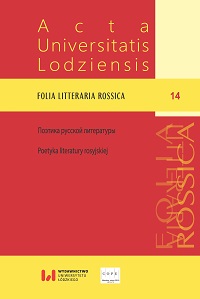Determinants of Time in Yevgeny Vodolazkin’s Novel “The Aviator”
DOI:
https://doi.org/10.18778/1427-9681.14.21Keywords:
contemporary Russian literature, prose, diary, determinants of time, Yevgeny Vodolazkin, The AviatorAbstract
The paper is devoted to the category of time in the novel The Aviator (2016) by Yevgeny Vodolazkin, the category being the key to comprehending the conceptual universe of this text. The main aim of the study is to identify the temporal layers in the novel and to indicate the dominant attributes that define each of the described periods. In the paper time is considered as a phenomenon, and attribute (determinant) as its distinctive feature. Such an approach allows the author to identify not two, as in previous scholarly literature, but three layers of time: the period of pre- -revolutionary Russia, the period of the “Bolshevik hell”, and the period of Russia at the end of the second millennium. The interpretation of the nature of time in the novel has also been facilitated by a general consideration of the work’s genre affiliation. Basing on the conviction that the elements imperceptible in the historical process create a real picture of a certain period, thus encouraging the study of the minutiae of life in different times, the author describes various details, as well as classifies them. The representative groups of indicators are distinguished as follows: smells inherent to certain attributes, sounds emitted by attributes, elements of the characters’ everyday life as well as festive time, means of transport, and the arrangement of space. The concept of chronotope, developed by Mikhail Bakhtin, has also been important for the study. The author notices that the change of a historical reference point is accompanied by a new characterisation of the indicators. In the discussed novel it is precisely the attributes that make it possible to separate the temporal layers, and this, indeed, is their main function.
Downloads
References
Antoshkina, Ekaterina A. “Vremya kak obуekt poznaniya filosofii i drugikh nauk”. Izvestiya Rossiyskogo gosudarstvennogo pedagogicheskogo universiteta im. A. I. Gercena. Vol. 22, No. 53 (2007): 14–20.
Google Scholar
Bakhtin, Mikhail M. Formy vremeni i khronotopa v romane. Ocherki po istoricheskoi poetike. In: Voprosy literatury i estetiki. Issledovaniya raznykh let. Moskva: Khudozhestvennaya literatura, 1975: 373–384.
Google Scholar
Bochkina, Mariya V. “Otrazhenie srednevekovoi kontseptsii vremeni v romanakh E. Vodolazkina ‘Lavr’ i ‘Aviator’”.Vestnik Rossiyskogo universiteta druzhby narodov. Seriya: Literaturovedenie, zhurnalistika. Vol. 22, No. 3 (2017): 475–483.
Google Scholar
Chernyshova, Tatуana L. “Organizatsiya khudozhestvennogo vremeni v romane E. G. Vodolazkina ‘Aviator’”. Povolzhskii pedagogicheskii vestnik. Vol. 5, No. 4 (17) (2017): 163–167.
Google Scholar
Filatov, Kirill S. “Khvalit nelzya rugat. Evgenii Vodolazkin. Aviator (retsenziya)”. Zvezda. No. 6 (2016) https://magazines.gorky.media/zvezda/2016/6/evgenij-vodolazkin-aviator.html
Google Scholar
Grimova, Olga А., “Osobennosti funktsionirovaniya narrativnykh intrig v romane E. G. Vodolazkina ‘Aviator’”. Novyi filologicheskii vestnik, No. 4 (43) (2017): 48–58.
Google Scholar
Gurevich, Aron Ya., “Kategorii srednevekovoy kultury”, Moskva: Iskusstvo, 1984: 43–44.
Google Scholar
Krotova, Darya V. “Razmyshleniya o revolutsii v tvorchestve A. Varlamova i E. Vodolazkina (‘Myslennyj volk’ i ‘Aviator’)”. Vestnik Rossiyskogo universiteta druzhby narodov. Seriya: Literaturovedenie, zhurnalistika. Vol. 23, No. 4 (2018): 393–401.
Google Scholar
Lotman, Yuriy M., “Struktura khudozhestvennogo teksta”, Moskva: Iskusstvo, 1970 https://bookscafe.net/read/lotman_yuriy-struktura_hudozhestvennogo_teksta-43995.html#p102
Google Scholar
Nikolaev, Aleksei I. Osnovy literaturovedeniya. Uchebnoe posobie dlya studentov filologicheskikh spetsialnostei. Ivanovo: LISTOS, 2011 https://ru.b-ok.cc/book/3239082/275b74
Google Scholar
Novoselov, Mikhail M., Pivovarov, Daniil V., Atribut. In: Gumanitarnyi portal. Moskva, 2020 https://gtmarket.ru/concepts/7015
Google Scholar
Ponkratova, Ekaterina M., Kobernik, Lyubov N. “Olfaktornye yavleniya v proizvedeniyakh F. M. Dostoevskogo”. Filologicheskie nauki. Voprosy teorii i praktiki. No. 74 (2017): 32–34.
Google Scholar
Povalko, Polina Yu. “Prostranstvo i vremya kak kategorii khudozhestvennogo teksta”. Vestnik Rossiyskogo universiteta druzhby narodov. Seriya: Teoriya yazyka. Semiotika. Semantika. No. 3 (2016): 106–112.
Google Scholar
Slovar russkogo yazyka: v 4-kh tomakh. Vol. 1, ed. A. P. Evgeneva. Moskva: AST, 1999: 51.
Google Scholar
Soldatkina, Yanina V. “Motivy prozy A. P. Platonova v romane E. G. Vodolazkina ‘Aviator’”. Rhema. Rema. No. 3 (2016): 19–28.
Google Scholar
Vedenkova Ekaterina S., “Issledovanie khudozhestvennogo prostranstva-vremeni: Voprosy metodologii”, Vestnik Tambovskogo universiteta. Seriya Gumanitarnye nauki. No. 12 (2011): 279–284.
Google Scholar
Vodolazkin, Evgenii G. Aviator. Moskva: AST, 2019.
Google Scholar
Wojciechowska, Magdalena. “‘Aviator’ Evgeniya Vodolazkina kak zhanr dnevnika”. Acta Universitatis Lodziensis. Folia Litteraria Rossica. No. 12 (2019): 199–211.
Google Scholar
DOI: https://doi.org/10.18778/1427-9681.12.19
Zhulkova, Karina A. “Kategoriya vremeni v romanakh E. G. Vodolazkina ‘Lavr’ i ‘Aviator’. (Obzor)”. Sotsialnye i gumanitarnye nauki. Otechestvennaya i zarubezhnaya literatura. Literaturovedenie: referativnyi zhurnal. No. 3 (2018): 191–200.
Google Scholar












